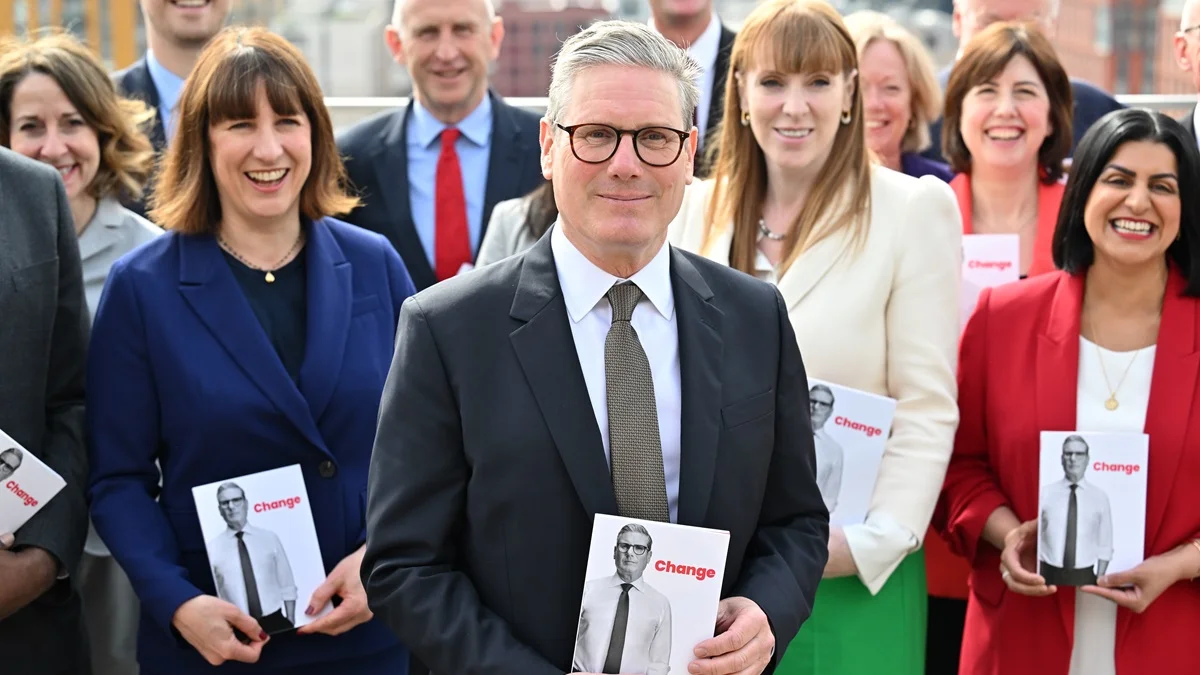
This article is an online version of our Off to Lunch newsletter. Sign up to receive it straight to your inbox here.
Labour’s GB Energy proposal and its plans for growth have been squarely at the centre of its manifesto. Those are looking increasingly likely to become UK policy as the party maintains a 20+ point lead over the Conservatives with only eight days to go until polling day.
One business exec backing the plans is Labour donor Dale Vince. The Ecotricity owner doesn't believe the state-owned enterprise will cannibalise the private sector. Instead, he suggests, it could “invest in and dominate, and in effect lead a new technology”.
GB Energy aims to save UK households £93bn and deliver 100 per cent clean power by 2030. Last year, 32 per cent of Britain’s electricity came from gas-fired power plants. Talking to the Financial Times, the green entrepreneur says that the plan “could make its mark”.
One of the main ways the Labour party wants to grow the economy is by liberalising planning laws. But after analysing the manifesto, the Institute for Fiscal Studies (IFS) is wary of this plan’s deliverability. “I bow to nobody in my keenness to overhaul our costly and sclerotic planning regime,” says IFS director Paul Johnson. “It will be technically difficult and politically painful. All power to their elbow on this one.”
Johnson also warns Starmer of the cost of his party’s green focus: “Remember, there is a choice here. If you had £5bn a year to put into the most growth-friendly policy, it is unlikely that green investment is what you’d choose.”
The next government is already feeling the heat to reform green laws from Vauxhall- and Peugeot-owner Stellantis. The manufacturer, which has plants in Ellesmere Port and Luton, has threatened to move production to other sites in Europe. It is encouraging the next prime minister to do more to stimulate demand for electric vehicles or change its current electrification policy.
Speaking at the Society of Motor Manufacturers and Traders’ annual summit in London yesterday, Stellantis UK group managing director Maria Grazia Davino said: “You have to make strategies that are based on efficiency. I want to keep the production in the UK – and I want to be clear on this – but if this market becomes hostile for us, we will enter an evaluation of producing elsewhere.” The company has over 2,500 people.
Our political expert Steven Swinford has broken down the Labour party’s manifesto plans. He that the party will have difficult choices to make on both tax and spending should it gain power. Green solutions and how to get to net zero are key among them.
“Labour has already adopted Tory plans to increase public spending by just 1 per cent, an approach that would mean significant cuts to unprotected departments. At the same time, the party has said it will retain Tory plans to freeze income tax thresholds, which will see millions of people dragged into paying higher rates of tax by 2027-28. Given that Starmer has ruled out a return to austerity, tax rises appear to be a realistic possibility as Labour seeks to balance the books.”
You can read his full piece here.
Business Question
What's the minimum age you can be a company director in the UK?
A. There is no minimum
B. 14
C. 16
D. 18
The answer can be found at the bottom of the page.
Business in Brief
Everything you need to know
1. Lufthansa is introducing an “environmental cost surcharge” on flights from next year to cover the cost of complying with clean-air regulations in Europe. The company says that while it invests “billions in new technologies every year” it cannot bear the growing costs “on its own”. Tickets could go up in price by as much as €72 for flights leaving the EU, UK, Norway and Switzerland. You can read more here.
2. HSBC and Barclays are cutting rates on some of their fixed mortgage deals following improvements in money market swap rates and amid expectations the Bank of England will cut interest rates in August. Barclays has reduced rates by 0.25 percentage points on some deals, with HSBC following suit and other lenders expected to do the same. Brokers believe this could be the start of a “summer of savings” for homeowners that could help ease the cost-of-living crisis. You can read more here.
3. UK-based burrito chain Tortilla is stepping up its European expansion with the acquisition of its biggest competitor on the continent. The deal for Fresh Burritos, which is worth nearly £4m, gives the chain a number of prime locations in cities including Paris, as well as rights to the brand. The company says it will use the purchase to give it a “launchpad” to expand further into Europe. You can read more here.
4. UK fintech Funding Circle has sold its loss-making US division for £33m as it looks to simplify its business and make its way to profitability. Funding Circle is a small business lender but has struggled amid mounting competition in the space. Losses have increased from £13m in 2022 to £33m last year. Last month it announced plans to cut 120 jobs, while its CFO Oliver White also stepped down. You can read more here.
5. Sir Patrick Vallance, the UK chief scientific advisor during the Covid pandemic, has spoken to Form Ventures about the UK tech industry. He has been running a review into pro-innovation regulation of technologies, including life science, green industries, generative AI, drones and space. He warns on the barriers holding the UK back, including that, for regulators, “the incentive to take risk is virtual zero. Read the full interview here.
Business Quotes
Inspiration from leaders
"Nothing will work unless you do."
- John Wooden
Business Thinker
Ideas on the future of business and leadership
1. ? Why we must not give up on economic growth?
3. ? Reinventing the core value statement ?
And finally...
Bernard Arnault, the chairman and CEO of LVMH, doesn’t give many interviews so when he does it's worth spending some time reading what he thinks. This is a man who has built one of the world’s biggest and most valuable companies not through innovation or technology but by assembling an empire in luxury retail, spirits and travel.
Speaking to Bloomberg Businessweek, he talks about succession, his acquisition strategy and the power of celebrity tie-ups. But he is particularly interesting on how he has built LVMH into the behemoth it is today – one that has made him one of the richest men in the world.
“I saw how the luxury market was made up of many medium-sized companies that, taken together, could be much stronger in a group composed of several brands,” he says. His argument is that the stronger brands help the weaker ones, giving them time to establish themselves and grow. Plus there are economies of scale in these companies sharing back-office functions and benefits in terms of attracting and retaining people.
You can read the full interview here.
The answer to today's Business Question is 16.
Related and recommended
Richard Harpin, the founder of HomeServe and Growth Partner and owner of Business Leader, answers your burning business questions
Contestants from The Apprentice reveal the fundamental business lessons they learned from taking part in the TV show
From global talent pools to AI-powered documentation, a work-from-anywhere model is a new way of thinking about productivity, innovation and teamwork
The story of how cycling brought Business Leader member John Readman together with his co-founder and investors




